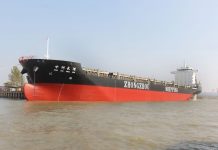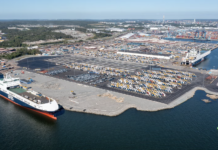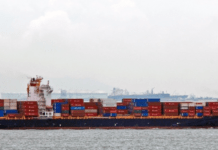
Maersk has announced the opening of its first Russian Inland Container Depot (ICD) at the Port of Novorossiysk, the largest port on the Black Sea.
Located 10 kilometres away from the port, Maersk’s ICD operates two rail services of 570m in total and it is equipped with fertilisers, liquid cargoes, as well as general and palletised cargo handling facilities.
The new depot will create over 48 jobs and will add needed storage and cross-dock capacity to relieve strained supply chains, according to a statement.
Particularly, the facility spreading across 30,000m² has a capacity of 1,500TEU and its annual turnover is expected to reach 25,000 containers.
The new depot is the 11th facility in Europe and the 74th in the world of the Danish carrier.
Novorossiysk is one of the biggest export hubs and gateways in Russia, as it is connected by rail and highways to the main industrial and population centres of Russia, Transcaucasia, and Central Asia.
Head of Maersk Eastern Europe, Zsolt Katona believes that this new facility allows customers more time and flexibility in decision-making, as they can now easily make destination routing decisions upon arrival at the discharge port instead of at origin.
“Operating Inland Services in Novorossiysk allows Maersk to offer differentiated and unique End-to-End integrated solutions to its customers, from stuffing at the origin until delivering at overseas destinations,” he said.

“Novorossiysk is one of the most important hubs, and we experience a lot of complexity there to accommodate our growing volumes and get reliable suppliers,” noted Managing Director at Europack LLC, Ludvig Tarkhanyan, who went on to point out the benefits of the launch of the new depot.
“By getting one-stop-shop solution from Maersk we would be able to reduce workload and, consequently, add transparency and efficiency to processes to focus on trading our goods to wider geographies instead,” he said.
Last but not least, Zsolt Katona highlighted that Russia is one of the largest global exporters of bulk commodities.
“To enable the fast-growing export market, depots are a key component for customers’ supply chain to convert bulk cargo into containers and export further to overseas regions,” he concluded.








